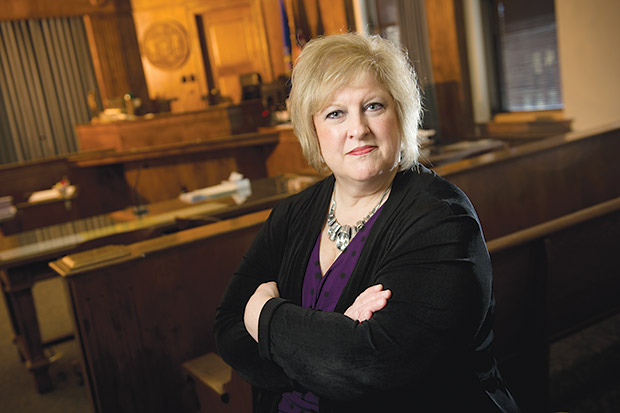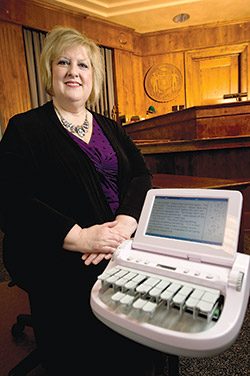Some proceedings could face future without court reporters
By: Erika Strebel, [email protected]//March 8, 2017//
Some proceedings could face future without court reporters
By: Erika Strebel, [email protected]//March 8, 2017//

Much like criminal and civil cases, the typical workers’ compensation proceeding has certain fixtures: a judge, lawyers, witnesses and a court reporter.
That last player, while often working in the background, has long been ensconced in state law. Outside emergency situations, a court reporter must now be present at all workers’ compensation hearings. There is a staff of seven court reporters who help ensure that requirement is met.
“The court reporter is essentially the judge’s right-hand person to make sure everything goes accordingly,” said Charlie Domer, a Milwaukee attorney who represents injured workers in workers’ comp cases.
Gov. Scott Walker’s latest budget proposal, if adopted unchanged by the state Legislature, would change all that. Rather than requiring reporters to be present at workers’ comp hearings, officials would be allowed to rely on electronic recordings.
Lawyers who represent both parties in workers’ compensation cases, as well as court reporters themselves, say the change would be a mistake.
Bob Gramann, president of Milwaukee-based Gramann Reporting, said there are two flaws to the proposal. First, he said, audio recordings are not necessarily easy to transcribe. Many times, typists find themselves struggling to make out words through the external noises that a recording might pick up.
“The other problem with doing digital recordings is that you have people who are transcribing digital recordings that haven’t a clue what this stuff is,” he said.
Wisconsin Court Reporters Association President Sheri Piontek noted that court reporters have special training in legal and medical terminology. Long experience has also made them adept at tuning out external noises.

“You can’t take the human element out of making a verbatim record, because when you hear things in an audio-recorded hearing you get those muffled sounds in the background, and all those external noises overlap the human words,” Piontek said. “The human court reporter can tune it out.”
Piontek noted that various states that have tried a similar change have eventually reversed course. California, for instance, went back to using court reporters after finding that recordings increased the time it took to get a transcript ready for an appeal.
Lawyers have been generally opposed to proposals to allow digital recordings. The Wisconsin Association for Justice, which represents the plaintiffs’ bar, recently joined the Wisconsin Defense Counsel and the Wisconsin Association for Worker’s Compensation Attorneys in sending the governor a joint statement opposing the DOA’s plan to replace court reporters with digital recordings.
Domer said court reporters play a crucial role in helping workers’ comp proceedings reach fair and just outcomes. They do this, in part, by making sure lawyers and other parties maintain decorum by not interrupting each other. They also make sure every word that is put down in the record is attributed to the proper speaker.
“That’s not a guarantee with an audio recording,” Domer said. “A digital recorder can’t tell people to speak up or speak slowly or, most importantly, keep people from speaking over each other.”
Thomas Rohe, a long-time Milwaukee workers’ compensation defense attorney, agreed. He noted that court reporters can be trusted to know the legal and medical terms, as well as doctors’ names, found in particular case. Another advantage is their familiarity with the workers’ compensation system itself.
“We’re losing a very key component to the system,” Rohe said. “I want to compare it with unemployment-insurance proceedings, which use tape recorders. The machine doesn’t pick up everything. UI can probably get away with it because the money at issue is so small, whereas in workers’ compensation, you’re dealing with hundreds of thousands of dollars, maybe millions.
You’re dealing with a different scope of importance to the case.”
Piontek says she thinks Walker is aware of these concerns. Officials in his administration had at one time contemplated completely doing away with the state’s court-reporter requirements for workers’ comp hearings and instead making electronic recordings mandatory.
But the governor’s actual budget proposal, released last month, backs away from that idea. Rather than completely replacing court reporters, Walker is merely calling for recordings to be allowed as a substitute.
That’s not to say that big changes aren’t in store, though. Walker’s budget proposal would eliminate four of the seven full-time court reporters who cover all of the state’s workers’ comp hearings.
Domer said the biggest complaint that attorneys have is that Walker’s budget would not set aside money for additional recording equipment or training. They also worry that the reliance on sometimes inaudible recordings could cause liability in workers’ comp cases to be assigned with the use of inaccurate transcriptions.
“If court reporters are eliminated, private parties will be bringing their own private court reporters, and we may have a dispute as to who owns the transcript,” he said.
Piontek and Gramann said technology has not advanced far enough to make court reporters superfluous or redundant.
Gramann noted his court-reporting firm will provide digital audio recordings that allow parties who want to document a proceeding to do so using a DVD format. But the resulting transcriptions are not cheap.
“Ninety percent of the time those proceedings will not be transcribed,” he said. “If it does happen, they send that DVD out to Gramann Reporting, and we have people transcribe those DVDs but charge a hellacious rate because it’s hard to do.”
Piontek said in the age-old battle between man and machine, machines have yet to best people in the business of providing accurate courtroom transcriptions.
“There’s nothing out there that will process more quickly than the human brain,” said Piontek. “Maybe it will someday.” Follow @erikastrebel
Legal News
- Chicago man sentenced to prison after being caught with ‘Trump Gun’
- FTC bans non-competes
- Gov. Evers seeks applicants for Dane County Circuit Court
- Milwaukee man charged in dismemberment death pleads not guilty
- Democratic-led states lead ban on the book ban
- UW Madison Professor: America’s child care crisis is holding back moms without college degrees
- History made in Trump New York trial opening statements
- Prosecutor won’t bring charges against Wisconsin lawmaker over fundraising scheme
- Republican Wisconsin Senate candidate says he doesn’t oppose elderly people voting
- Vice President Harris to reveal final rules mandating minimum standards for nursing home staffing
- Election workers fear threats to their safety as November nears
- Former law enforcement praise state’s response brief in Steven Avery case
WLJ People
- Power 30 Personal Injury Attorneys – Russell Nicolet
- Power 30 Personal Injury Attorneys – Benjamin Nicolet
- Power 30 Personal Injury Attorneys – Dustin T. Woehl
- Power 30 Personal Injury Attorneys – Katherine Metzger
- Power 30 Personal Injury Attorneys – Joseph Ryan
- Power 30 Personal Injury Attorneys – James M. Ryan
- Power 30 Personal Injury Attorneys – Dana Wachs
- Power 30 Personal Injury Attorneys – Mark L. Thomsen
- Power 30 Personal Injury Attorneys – Matthew Lein
- Power 30 Personal Injury Attorneys – Jeffrey A. Pitman
- Power 30 Personal Injury Attorneys – William Pemberton
- Power 30 Personal Injury Attorneys – Howard S. Sicula











